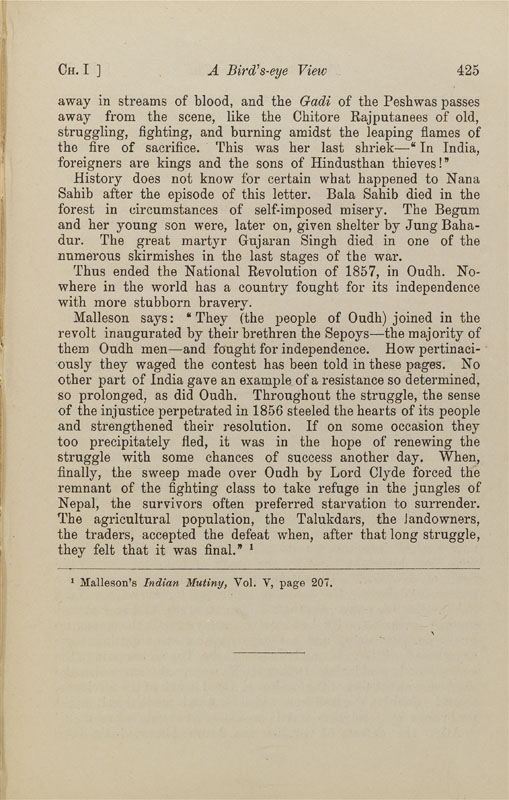Ch. I ]
A Bird's-eye View
425
away in streams of blood, and the Gadi of the Peshwas passes
away from the scene, like the Chitore Rajputanees of old,
struggling, fighting, and burning amidst the leaping flames of
the fire of sacrifice. This was her last shriek—" In India,
foreigners are kings and the sons of Hindusthan thieves!"
History does not know for certain what happened to Nana
Sahib after the episode of this letter. Bala Sahib died in the
forest in circumstances of self-imposed misery. The Begum
and her young son were, later on, given shelter by Jung Baha¬
dur. The great martyr Gujaran Singh died in one of the
numerous skirmishes in the last stages of the war.
Thus ended the National Revolution of 1857, in Oudh. No¬
where in the world has a country fought for its independence
with more stubborn bravery.
Malleson says: " They (the people of Oudh) joined in the
revolt inaugurated by their brethren the Sepoys—the majority of
them Oudh men—and fought for independence. How pertinaci¬
ously they waged the contest has been told in these pages. No
other part of India gave an example of a resistance so determined,
so prolonged, as did Oudh. Throughout the struggle, the sense
of the injustice perpetrated in 1856 steeled the hearts of its people
and strengthened their resolution. If on some occasion they
too precipitately fled, it was in the hope of renewing the
struggle with some chances of success another day. When,
finally, the sweep made over Oudh by Lord Clyde forced the
remnant of the fighting class to take refuge in the jungles of
Nepal, the survivors often preferred starvation to surrender.
The agricultural population, the Talukdars, the landowners,
the traders, accepted the defeat when, after that long struggle,
they felt that it was final.'
» 1
* Malleson's Indian Mutiny, Vol. V, page 207.
|








